Teams, tales and tips – a guide to the local game
Romania’s second city of Cluj-Napoca, de facto capital of Transylvania, is home to 2019 champions CFR and local rivals Universitatea, or ‘U’. Until recent financial upheavals saw ‘U’ lose their top-flight status, even their name, their long-term pedigree overshadowed the railwaymen of CFR. That all changed once entrepreneur Árpád Pászkány took over the Feroviarii in 2002.
The CFR owner invested over €100 million in the club, almost a third of it in their modestly sized stadium, the Dr Constantin Rădulescu, visible from trains pulling into Cluj-Napoca station. An ethnic Hungarian in this region of ancient strife and shifting borders, Pászkány took on the big boys of Bucharest and won, picking up three titles in six seasons. In May 2014, feeling he had taken the club as far as he could, Pászkány announced that he had sold his shares to a group of investors.

In 2017, Cluj-born financial auditor Vasile Marian Băgăcean bought a majority shareholding in the club, allowing it to escape insolvency and win two further titles, in 2018 and 2019.
Both CFR (‘chef-fair-rei’) and ‘U’ were founded in the early 20th century. CFR is the acronym for the local railways, with which the club has always been associated.
As their name suggests, Universitatea were formed by students, specifically from the local University of Medicine. As Știința (‘Science’) Cluj, they won the Romanian Cup in 1965. Considered the local team, ‘U’ now play at the gleaming Cluj Arena, financed by the Cluj County Council and national government, opened in 2011.

Local derbies are fierce affairs, most notably the on-field fisticuffs that caused the clash of May 2012 to be abandoned. Then there was the cup semi-final of 2015 that didn’t produce a single goal over two legs and was settled on penalties. Between fans, animosity was at its height immediately after World War I, when Transylvania, and Cluj-Napoca itself, changed hands from Hungary to Romania.
Back then, the key local team was Victoria Cluj, league runners-up three times but dissolved in 1947. Today, for the first time in Romanian football history, league titles have been heading this way, along with European lucre. For how long may be entirely up to the new investor in the Railwaymen – under-achieving U only came close to a return to Liga I in 2019.
Getting Around
Arriving in town, local transport and timings

Cluj-Napoca Airport is 9km (6 miles) east of town, connected by bus 5 (Mon-Sun every 10-15mins) to the train station. Make sure that the bus is heading for Piața Gării Sud and not in the opposite direction. There’s also bus 8 (Mon-Fri only, every 30mins – not 9am-1.30pm) to the downtown transport hub of Piața Mihai Viteazul – again, check it’s going in the right direction. Journey time for each is about 30mins. From the terminal, you’ll find the bus stop is through the car park, veering right onto the main road.
Return tickets (5 lei/€1 return) are sold at kiosks and validated in the funny little round metal punchers on board.
A taxi from the airport should cost about 30 lei/€6.35. Diesel Taxi (+40 264 946) is as good as any. City transport, buses, trams and trolleybuses, also runs on the same punch-ticket system, 2.50 lei singles from vending machines, 2-journey 5 lei from kiosks. A one-day pass is 14 lei/€3.
Where to Drink
The best pubs and bars for football fans
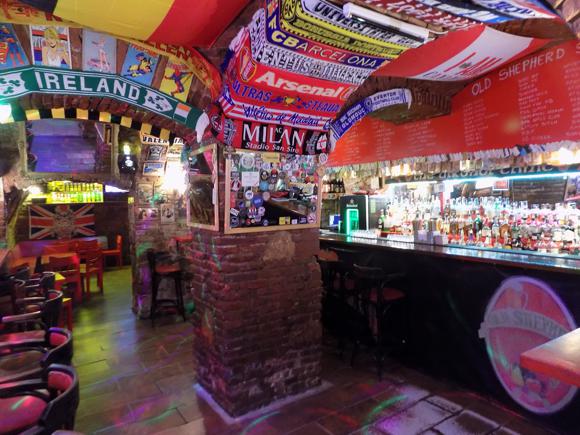
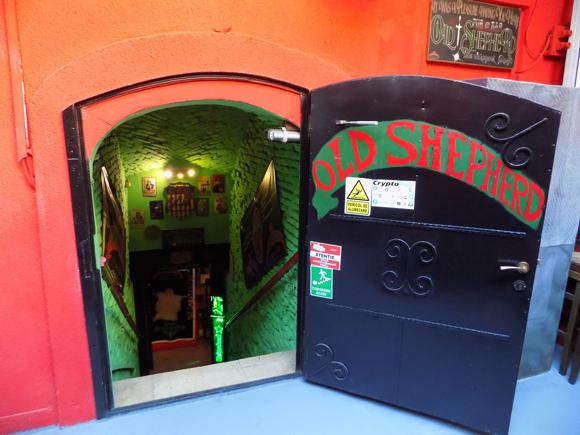
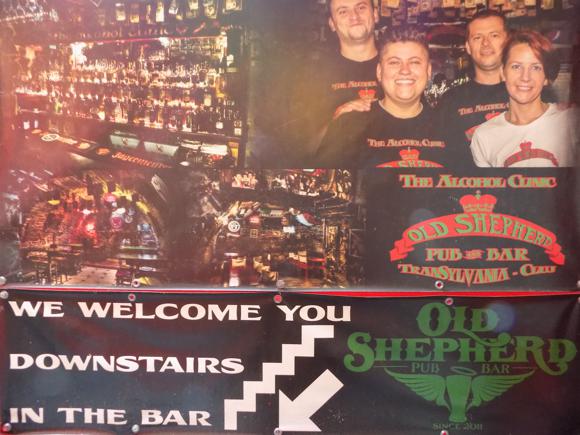
Despite the sad closure of the football-focused Cram In Pub, there are plenty of drinking spots to choose from in the bar hub between main square Piața Unirii and the river.
Near the main square, the family-owned Old Shepherd at Strada Matei Corvin 2 shows games and offers a decent range of beer. Summer closing means that fans in town for the early rounds of European tournaments have to seek sustenance elsewhere. Close by on Strada Vasile Goldiș, O’Peter’s also screens matches, particularly when Liverpool are playing – it’s the main meeting place for Cluj Reds. Across the way, Shadow attracts a party crowd.
Nearby on Strada Roosevelt, The Soviet is worth a visit for its themed decor, which also inspires the cocktails. A few houses along, the Klausen Pub remains old-school with a decent choice of beers. In the same building, the Vintage Bistro is burger heaven.
Towards the river, on Strada Émile Zola, the Londoner Pub does a roaring trade on match – and quiz – nights. Atop the Central Shopping Center by the Hotel Transilvania, Klausen Burger provides all kinds of craft beers plus panoramic views of Cluj, handy to get your bearings if you’ve just arrived – it’s up on the fourth floor. On the same level, the Rounders Sports Bar & Grill is lined with nine big screens broadcasting sport, with matches scheduled all weekend.
Just over the river, the Irish & Music Pub at Strada Horea 5 hosts live music and serves hearty food, including steak, but doesn’t stretch its remit to Guinness – it’s Ursus and Timișoreana on draught.
Where to stay
The best hotels for the stadiums and city centre
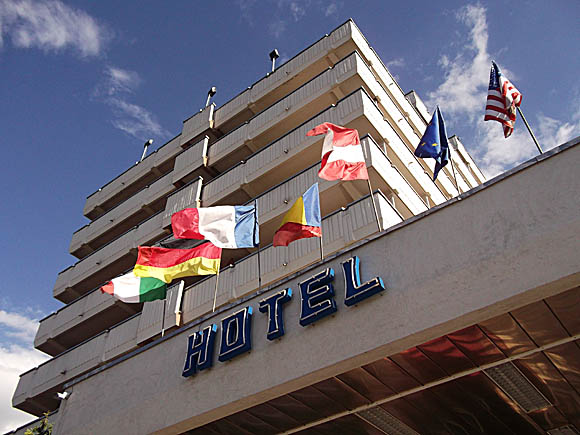
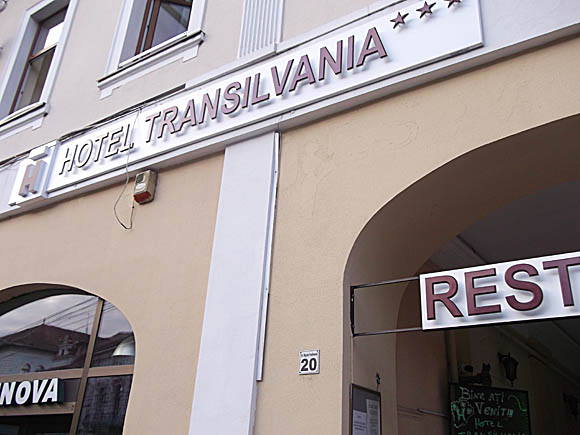
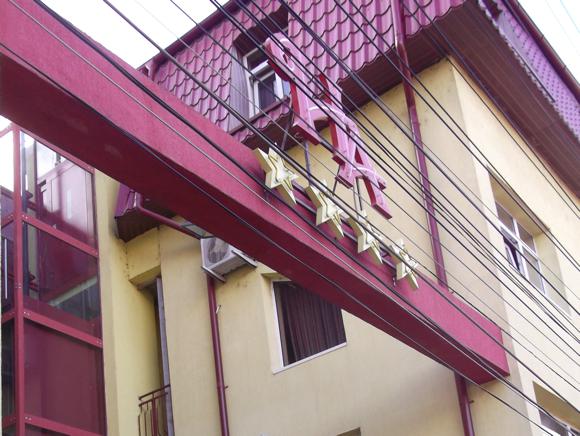
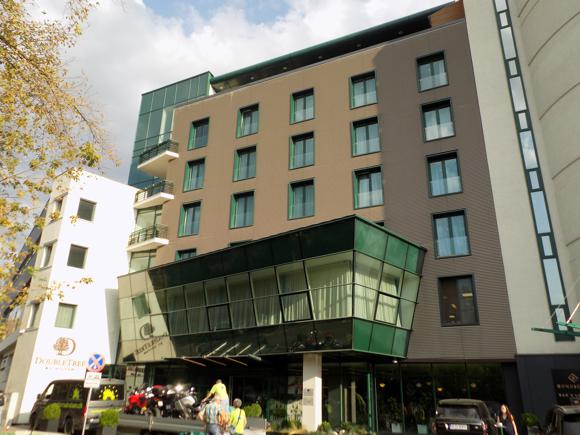
The tourist office website has a comprehensive hotel database.
Near the CFR ground, the closest accommodation is the Casa Raul on Strada Migdalului, cheap, simple, friendly and even with its own little bar. The stadium is barely five minutes away. Also close, on Strada Magaziei, the Hotel Ary is a pleasant, mid-range lodging with a bizarre pricing system of a three-star double at €50, a four-star at €200. On the plus side, it has a spa and restaurant.
The old-school hilltop three-star Belvedere (Str Călășilor 1, +40 264 432 071) is halfway between CFR and town, a climb up from the narrow little river that crosses Cluj. Across the water, the DoubleTree by Hilton Cluj on Strada Sindicatelor is probably the best lodging in town, with a heated pool, sauna and gym.
For value and location close to Universitatea, the Hotel Sport (Aleea Stadionului, +40 264 593 921) is a classic old Socialist lodging alongside the Cluj Arena, near a pretty boating lake. Breakfast is included in the internet booking-site rates of less than €20 per person.
Nearer town at Octavian Goga 1 but still within easy reach of both grounds, the Grand Hotel Napoca is a renovated four-star. Dead central at Regele Ferdinand 20, the three-star Hotel Transilvania is where ‘Dracula’ character Jonathan Harker stays in Bram Stoker’s novel.





